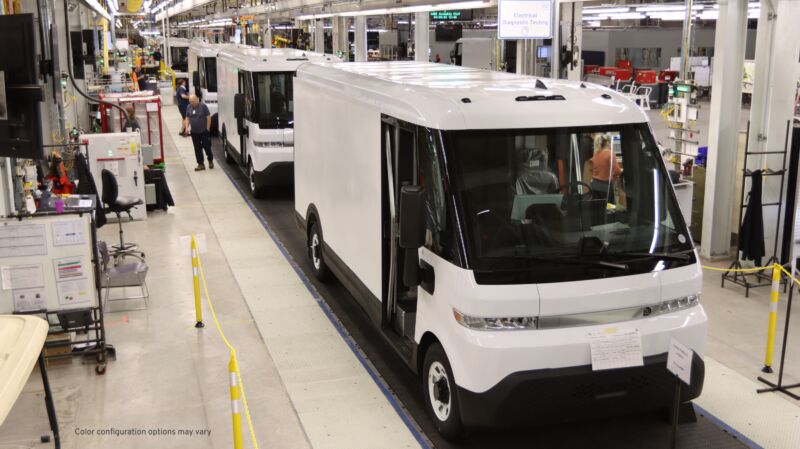Battery shortage forces GM to pause commercial EV production

General Motors has idled production of some of its electric vehicles due to a battery shortage. BrightDrop—a GM startup brand that’s building last-mile delivery vans for companies like FedEx and Verizon—has stopped building EVs at its plant in Ingersoll, Canada, due to a lack of Ultium battery cells.
GM debuted BrightDrop and its delivery van during chairwoman Mary Barra’s keynote address at CES in 2021. The van was developed in record time—just slightly quicker than the electric Hummer, and like that EV, it leverages GM’s new Ultium batteries.
Production began later in 2021, at first being conducted under contract in Michigan with an unnamed company as GM refitted its CAMI plant in Ingersoll. CAMI started production in December 2022, and BrightDrop has years of orders to fulfill, but some of those customers will end up waiting longer due to a lack of batteries to power the electric vans.
This isn’t the first time problems with Ultium cells have affected GM’s EV production. In 2022, it had to stop selling the BrightDrop Zevo 600 van and the Hummer EV due to badly sealed battery packs that could let water in. More than 65,000 people put in a reservation for that divisive EV, but production numbers have a long way to go before satisfying all that demand (ignoring for the moment that many of those reservations won’t convert to sales).
Likewise with the Cadillac Lyriq. When we tested this rather good EV last June, GM told us that it was increasing the first year’s production to 25,000 units due to demand. That was perhaps ambitious, and in 2022 it only delivered 122 Lyriqs. This year has been better, although by the end of June this year, Cadillac had still only delivered 2,438 total.
Currently, GM only has one operational Ultium factory, a joint venture with LG Energy Solutions in Lordstown, Ohio. But things at that plant have not been running entirely smoothly. At the end of June, it had to shut down production to fix an emissions problem, just as GM wanted to begin production of other Ultium-based EVs like the Chevrolet Silverado truck. Other safety issues at Lordstown, which have included a vehicle fire, are factoring into GM’s negotiations with the United Auto Workers union, which wants better safety conditions for workers.
A second Ultium plant at Spring Hill, Tennessee, is under construction and expected to open later in 2023, and a third in Delta Township, Michigan, is set to open in 2024. But a fourth Ultium plant, planned for Indiana, may not happen. LGES was also GM’s partner for the Chevrolet Bolt battery pack, and an LG manufacturing defect resulted in GM having to recall every Bolt to replace their battery packs.
A GM spokesperson told Ars that “we have been working our way through some supplier issues, and we’re planning to provide an update on EV production on our July 25 earnings call.” Further, it says its EV production is still going to plan. “We are on track to build 50,000 EVs in North America in the first half, and we haven’t changed our targets for the second half of 2023 and the first half of 2024. Both cell production and Ultium Platform production are on the rise,” the spokesperson said. Previously, GM has said it will have the capacity to build a million EVs a year in North America by 2025.
https://arstechnica.com/?p=1954854